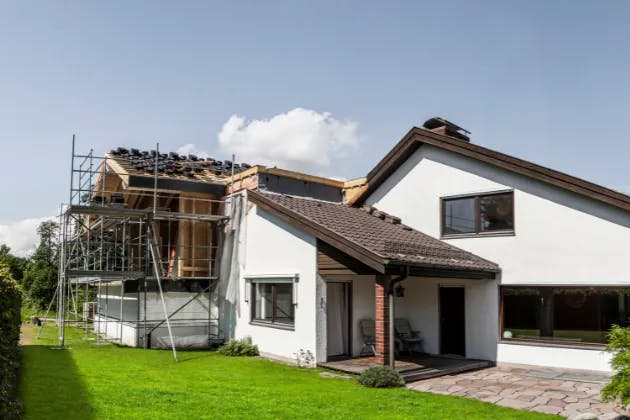Deciding whether to move house or build an extension is a critical crossroads for many homeowners. This decision isn't just about square footage—it's about finding the perfect solution that balances your lifestyle, budget, and long-term property goals.
Every homeowner eventually reaches a point where their current living space no longer meets their needs. Perhaps your family is growing, you're working from home, or you simply crave additional room to breathe. The two primary options—moving or extending—each come with a complex array of financial, emotional, and practical considerations.

Pros of Building an Extension
Added Value
Building an extension can significantly boost your property's value. A well-designed and executed extension can add up to 20% to your home's worth, making it a sound investment for the future. This increase in value often outweighs the initial cost of construction, particularly in areas with high property prices.
Customisation and Personalisation
One of the most compelling reasons to extend is the ability to tailor the new space precisely to your needs. Unlike moving to a pre-existing property, an extension allows you to create bespoke living areas that align perfectly with your lifestyle. Whether you need a home office, a larger kitchen, or an additional bedroom, you have complete control over the design, layout, and finishes.
Minimal Disruption
Contrary to popular belief, building an extension often causes less disruption than moving house. In many cases, you can continue living in your home while the work is carried out. This is particularly true for single-storey extensions or loft conversions. While there will be some noise and dust, it's typically localised and manageable, especially when compared to the upheaval of packing up your entire life and relocating.
Cost-Effectiveness
When considering all associated costs, extending your home is often more cost-effective than moving. While the initial outlay for an extension can be substantial, it pales in comparison to the cumulative expenses of selling your current property, purchasing a new one, and relocating. Estate agent fees, stamp duty, legal costs, and moving expenses can quickly add up, often making an extension the more economical choice in the long run.
Cons of Building an Extension
Disruption and Mess
Despite efforts to minimise disruption, building an extension inevitably involves some level of inconvenience. Construction work generates noise, dust, and mess, which can be challenging to live with, especially for extended periods. Additionally, you may need to temporarily reconfigure your living arrangements to accommodate the work, which can be stressful for some households.
Initial High Costs
While extending is often more cost-effective in the long term, the initial financial outlay can be significant. Depending on the scale and complexity of the project, costs can range from £20,000 for a simple single-storey extension to over £100,000 for more extensive work. This substantial upfront investment can be daunting and may require careful financial planning or borrowing.
Potential Complications
Building an extension isn't always straightforward. You may encounter various complications, including:
- Planning permission: Depending on the scale and nature of your extension, you may need to navigate the complexities of obtaining planning permission from your local authority.
- Building regulations: All extensions must comply with building regulations, which can add complexity and cost to your project.
- Party wall agreements: If your extension affects a shared wall with neighbours, you'll need to negotiate a party wall agreement, which can be time-consuming and potentially contentious.
- Unforeseen structural issues: Once work begins, you may uncover structural problems with your existing property that need addressing, potentially increasing costs and timelines.
Pros of Moving House
New Environment and Opportunities
Moving house offers the chance for a fresh start in a new environment. This can bring numerous benefits, including:
- Access to better schools if you have children or are planning to start a family.
- Improved job opportunities if you're relocating to an area with a more vibrant job market.
- Enhanced lifestyle amenities, such as parks, restaurants, or cultural attractions, depending on your chosen location.
- The potential for a more suitable property that better meets your current needs without the need for extensive renovations.
Avoiding Construction Hassles
By choosing to move rather than extend, you sidestep the various challenges associated with construction work. This means no dealing with builders, no unexpected delays or cost overruns, and no living in a partially completed home. For many, the idea of simply moving into a ready-made property is far more appealing than enduring months of building work.
Cons of Moving House
High Costs
Moving house involves numerous costs that can quickly accumulate:
- Estate agent fees: Typically 1-3% of your property's sale price.
- Stamp duty: A significant expense, especially for higher-value properties.
- Conveyancing fees: Legal costs associated with buying and selling property.
- Removal costs: The expense of physically moving your belongings.
- Potential renovation costs: Your new property may require work to make it suitable for your needs.
These costs can often exceed the price of building an extension, particularly when moving to a more expensive area or a larger property.
Emotional Strain
Moving house can be an emotionally taxing experience. Leaving a home filled with memories can be difficult, especially if you've lived there for a long time or if it's where you've raised your family. The process of house hunting, negotiating purchases and sales, and the uncertainty of property chains can also be highly stressful.
Potential Complications in the Property Market
The property market can be unpredictable, which can complicate your moving plans. You may face challenges such as:
- Difficulty selling your current home, particularly in a slow market.
- Struggling to find a suitable new property within your budget, especially in competitive areas.
- Property chain issues, where your move depends on several other transactions completing successfully.
- The risk of a sale falling through at the last minute, potentially leaving you out of pocket for surveys and legal fees.
Making the Decision
Assess Your Needs
To make an informed decision, carefully evaluate your current and future needs:
- Space requirements: Consider how much additional space you need and whether this can be achieved through an extension or necessitates a move.
- Location priorities: Determine how important factors like schools, commute times, and local amenities are to you.
- Long-term plans: Think about how your needs might change over the next 5-10 years and which option best accommodates these future requirements.
Budget Considerations
Conduct a thorough financial assessment of both options:
- For extending, get detailed quotes from builders and factor in potential overruns.
- For moving, calculate all associated costs, including agent fees, stamp duty, and potential renovation costs for a new property.
- Consider the long-term financial implications, including potential increases in property value and ongoing maintenance costs.
Personal Preferences
Ultimately, your decision should align with your personal preferences and lifestyle:
- If you're deeply attached to your current home and neighbourhood, extending may be the better option.
- If you're craving a change of scenery or need to relocate for work or family reasons, moving might be more suitable.
- Consider your tolerance for disruption and your willingness to manage a construction project versus the stress of moving.
By carefully weighing these factors, you can make a decision that best suits your circumstances, ensuring that whether you choose to extend or move, you're making the right choice for your future.
Decided on an extension?
Think an extension is the right course of action for your property? Contact our builders in Sutton Coldfield, Tamworth, Solihull and Birmingham for help or advice.
Choosing the right extension type depends on your specific needs, property type, and budget. For expert advice, get in touch with our builders by calling us on 0121 405 0404.





